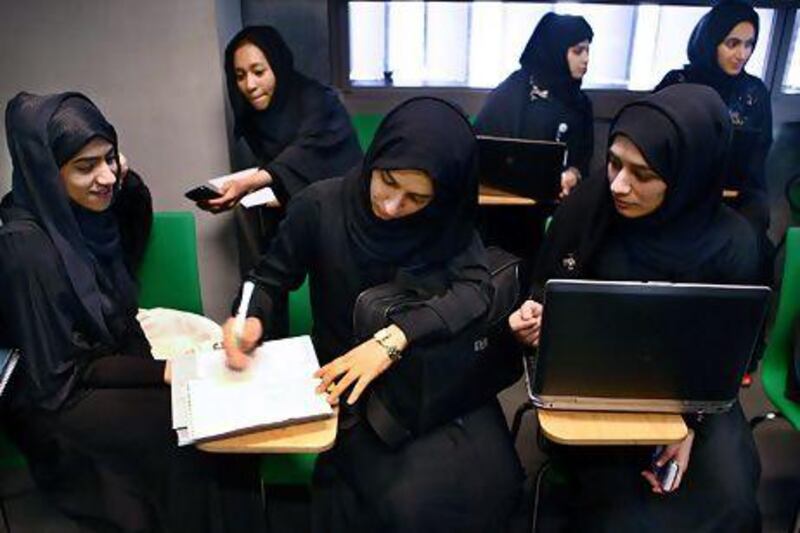Reem Al Junaibi is a self-confessed technology geek. "I've had an obsession with technology ever since I was young," she says.
Ms Al Junaibi went on to gain a bachelor's degree in information technology at Zayed University in Abu Dhabi and is studying for a master's in engineering systems and management at Masdar Institute.
She is similar to many young women in the Middle East who are increasingly choosing to study science at university. She is more unusual, however, in that she has continued her studies at the graduate-school level and is pursing a career as a scientist.
A recent report by the Economist Intelligence Unit (EIU), part of the Economist magazine group, and commisioned by ATIC showed that while more Arab women than men are graduating in science - and with higher marks - many of them do not progress to postgraduate research or into the workplace.
In Saudi Arabia, women accounted for 59 per cent of science-degree enrolments in 2006 and 2007; by the time these women graduated in 2010 they made up 73 per cent of science graduates. However, women accounted for only 1 per cent of researchers in the kingdom, according to Organisation of Islamic Conference statistics cited in the EIU report. The picture is similar - if not quite as dramatic - across the Middle East, including in the UAE.
Ms Al Junaibi offers one explanation: when a woman studies engineering it is generally considered that she will not be able to find a job that is culturally acceptable. "But there are jobs that are suitable for ladies in our culture," she insists.
Her current research is a technical feasibility study of bringing electric vehicles to Abu Dhabi.
The EIU report stresses that Middle Eastern countries must figure out how to make the workplace more attractive to women.
Ms Al Junaibi is perhaps fortunate to be working at the Masdar Institute, which, as a government-backed research centre, is geared towards helping to make the UAE a hub of innovation - part of Abu Dhabi's 2030 economic vision.
The company "is very supportive of its students", she says. "They give us everything we need to be innovative and successful."
Reem Ketait is also studying for an advanced degree in engineering systems and management at Masdar. She has a background in chemical engineering. She agrees with her colleague.
"Some [people] may have thought chemical engineering is only related to oil and gas and you need to work in the middle of the sea or the desert," she explains. "This could not be further from the truth and females in our field are very supported."
However, Onoud Saleh Al Marzooqi, an engineering management master's student at Abu Dhabi University who works for Emal, the aluminium company, describes the challenges that can exist.
"In my department there are only two ladies," she says. "I was a little bit shy and honestly had difficulty communicating because of it. After two years, it became normal for me to work in a primarily male department."
Crucial, of course, is keeping women in science as their careers progress and they have to juggle work with family commitments.
The EIU report suggests that employers should introduce parental leave, flexible shifts and other family-friendly policies. The report points out that "Oman has no legal framework covering maternity leave; and in Qatar, Syria, Bahrain and the UAE maternity leave is no more than 50 days."
On a more positive note, the report highlights that a number of firms are introducing some good practices in the region.
The Abu Dhabi Company for Onshore Oil Operations last year said it would offer more flexible working hours to the female graduates of the Higher Colleges of Technology that it plans to recruit. Women will be allowed to work morning or day shifts rather than the 24-hour rotations that are done currently.
Ms Al Marzooqi, Ms Al Junaibi and Ms Ketait are planning for the long haul. Ms Al Marzooqi says that her long-term career goal would be to have a job that involved both management and engineering.
"As I continue to grow into a more project manager space, who knows, over the long term I could become a CEO," she says.
Ms Junaibi confesses she is "in love with her work" and can't imagine staying at home.
"Lots of women working here have children," she says.
And Ms Ketait said that one of her future objectives is to serve on an international board.
"I would love to serve on an international platform pursuing the green cause," she said. "Something that would be challenging and dynamic while also contributing on a broader international level."





